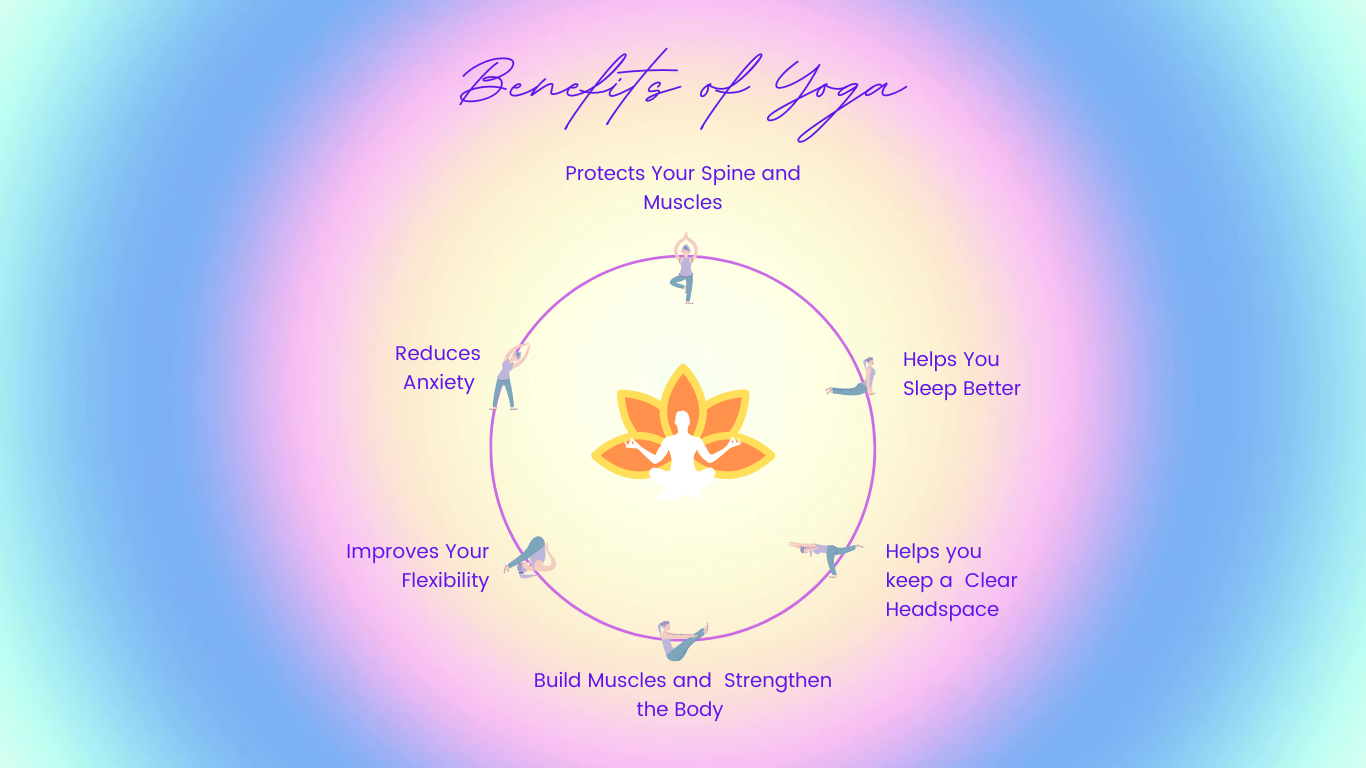Yoga is a powerful practice that goes beyond physical exercise. It includes various techniques that nurture the mind, body, and spirit. We will delve into multiple aspects of yoga, focusing on how they contribute to inner peace and strength. We’ll cover the importance of physical postures (asanas), the role of breath control (pranayama), the significance of meditation, and the impact of lifestyle and ethical principles (yamas and niyamas). Let’s explore how these elements combine to create a holistic approach to well-being.
The Foundation: Physical Postures (Asanas)
Yoga often begins with asanas, the physical postures that most people are familiar with. These poses improve flexibility, strength, and balance. However, there are many more aspects that we will cover in future articles.
Building Physical Strength and Flexibility
Regular practice of asanas like downward dog, warrior poses, and sun salutations can significantly enhance physical strength and flexibility. These poses work on different muscle groups, helping to build a strong and resilient body. For instance, holding the plank pose strengthens the core, while various backbends can improve spinal flexibility.

Releasing Tension and Stress
Asanas also play a crucial role in releasing physical and mental tension. When you hold a pose, you learn to stay present by focusing on your breath. This mindfulness helps release accumulated stress and tension from your body. The child’s pose, for example, is excellent for relaxing the back and calming the mind.
Promoting Better Posture and Alignment
Many people suffer from poor posture due to long hours of sitting and working at desks. Yoga helps correct this by promoting better alignment. Poses like mountain pose and tree pose teach you how to stand tall and balanced. Good posture not only prevents injuries but also boosts confidence.
Promoting Better Posture and Alignment
Many people suffer from poor posture due to long hours of sitting and working at desks. Yoga helps correct this by promoting better alignment. Poses like mountain pose and tree pose teach you how to stand tall and balanced. Good posture not only prevents injuries but also boosts confidence.
Breath Control: The Power of Pranayama
Pranayama, or breath control, is another vital aspect of yoga. It involves various techniques that control the breath, which in turn influences the mind and body.
Balancing the Nervous System
Different pranayama techniques, such as alternate nostril breathing (Nadi Shodhana) and deep belly breathing, help balance the autonomic nervous system. This balance is crucial for managing stress and promoting relaxation. For example, Nadi Shodhana calms the mind and reduces anxiety.
Increasing Oxygen Flow and Energy
Controlled breathing increases oxygen flow to the brain and body, enhancing energy levels and mental clarity. The practice of Kapalabhati, or skull-shining breath, involves rapid, forceful breaths that revitalize the body and clear the mind.
Improving Focus and Concentration
Pranayama also improves focus and
concentration. Techniques like Bhramari (humming bee breath) help quiet the
mind and enhance mental clarity. This is particularly beneficial in our
fast-paced world, where distractions are constant.
The Quiet Mind: The Art of Meditation
Meditation is the practice of training the mind to achieve a state of calm and clarity. It’s a foundation of yoga that offers profound benefits for inner peace and strength.
Reducing Stress and Anxiety
Meditation is widely known for its ability to reduce stress and anxiety. By focusing on the present moment and letting go of worries about the past or future, you can achieve a state of deep relaxation. Guided meditations and mindfulness practices are excellent starting points for beginners.
Enhancing Self-Awareness
Meditation helps you become more self-aware. By observing your thoughts without judgment, you can develop a deeper understanding of your behavior and thought processes. This increased awareness is the first step towards personal growth and transformation.
Building Emotional Endurance
Regular meditation practice builds emotional endurance. It equips you to maintain composure and serenity when confronted with challenges. This inner strength helps you navigate through life's ups and downs with greater ease and grace.
Principled Living: Yamas and Niyamas
Yoga is not just about physical practice; it's also about living a life of integrity and purpose. The yamas and niyamas are ethical principles that guide behavior and lifestyle choices.
Yamas: Social Ethics
The yamas are social ethics that govern interactions with others. They include:
- Ahimsa (Non-Violence): Practicing kindness and compassion towards all living beings.
- Satya (Truthfulness): Being honest in thoughts, words, and actions.
- Asteya (Non-Stealing): Respecting others' belongings and not taking what is not yours.
- Brahmacharya (Moderation): Practicing self-control and moderation in all aspects of life.
- Aparigraha (Non-Hoarding): Letting go of greed and attachment to material possessions.
Niyamas: Personal Practices
The niyamas are personal practices that promote self-discipline and inner growth. They include:
- Saucha (Purity): Maintaining cleanliness of body and mind.
- Santosha (Contentment): Cultivating gratitude and satisfaction with what you have.
- Tapas (Discipline): Developing self-discipline and willpower.
- Svadhyaya (Self-Study): Engaging in self-reflection and study of spiritual texts.
- Ishvara Pranidhana (Surrender to a Higher Power): Trusting in and surrendering to the divine or a higher power.
Integrating Yoga into Daily Life
Integrating the various aspects of yoga into daily life requires consistency and dedication. Here are some practical tips to help you include yoga in your routine.
Establish a Regular Practice
Set aside time each day for yoga practice. Even 15-20 minutes can make a significant difference. Maintaining consistency is essential for reaping the rewards of practicing yoga. Choose a time that works best for you, whether it's early morning, during lunch breaks, or before bed.
Create a Dedicated Space
Create a quiet and comfortable space in your home for yoga practice. Having a dedicated space helps create a favorable environment for focus and relaxation. Keep your yoga mat, props, and any other items you need in this space.
Include Mindfulness Throughout the Day
Practice mindfulness throughout the day by paying attention to your breath, thoughts, and actions. Take short breaks to breathe deeply and reset your mind. Mindfulness can be practiced anywhere, whether you're at work, home, or traveling.
Stay Open to Learning
Yoga is a lifelong journey of learning and growth. Stay open to exploring new techniques and styles of yoga. Attend classes, workshops, and retreats to deepen your understanding and practice. Reading books and articles on yoga philosophy can also provide valuable insights.
The Transformative Power of Yoga
The transformative power of yoga lies in its ability to harmonize the mind, body, and spirit. By mastering multiple aspects of yoga, you can achieve inner peace and strength that goes beyond the confines of the yoga mat.
Building a Robust Body
Through regular practice of asanas, you build a strong body capable of handling physical challenges. This strength and flexibility translate into better overall health and vitality.
Cultivating a Calm Mind
Pranayama and meditation promote a calm and focused mind. They help you manage stress, improve concentration, and enhance emotional well-being. A calm mind is better equipped to navigate the complexities of life.
Living with Purpose and Integrity
The ethical principles of yamas and niyamas guide you to live with purpose and integrity. They encourage you to act with kindness, honesty, and self-discipline. Living by these principles fosters a sense of inner peace and fulfillment.
TO SUM UP
Mastering multiple aspects of yoga is a journey that leads to profound inner peace and strength. By incorporating physical postures, breath control, meditation, and ethical principles into your daily life, you create a holistic approach to well-being. Yoga is not just a practice but a way of life that nurtures the mind, body, and spirit. Embrace this journey with us and experience the transformative power of yoga.










Add comment